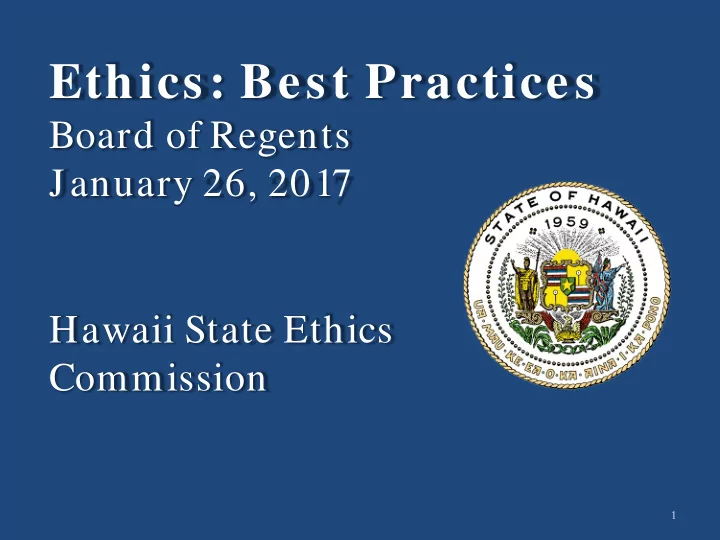

Ethics: Best Practices Board of Regents January 26, 2017 Hawaii State Ethics Commission 1
State Ethics Code HRS chapter 8 4 • State Employees • State Legislators • Members of State Boards and Commissions 2
Ethics Code: Subject Areas • Confidential Information • Gifts/ Gifts Disclosure • Fair Treatment • Financial Disclosure Statements • Conflicts of Interests • State Contracts • Post-Employment Restrictions 3
GIFTS HRS § 84-11 No employee shall accept or solicit any gift if it is reasonable to infer that the gift is intended to influence or reward official action. 4
GIFTS Food • • Entertainment Travel • Gift certificates • • Discount cards or passes Loans • • Money Services • Anything of value • 5
GIFTS Factors to consider: • VALUE: How much is the gift worth? • RELATIONSHIP: What is the donor’s relationship to the recipient? Does the recipient take official action affecting the donor? • STATE PURPOSE: Does the gift benefit the State? 6
Gifts 1. Can you accept gift? (HRS § 84-11) 2. If you can accept gift, must you report it? (HRS § 84-11.5) 7
GIFTS DISCLOSURE HRS § 84-11.5 Requires a gifts disclosure statement to be filed if certain conditions are met: 1. An employee (or spouse or dependent child) receives any gift(s) whose value, singly or combined, is more than $200; and 2. The source of the gift has interests that may be affected by official action by the employee; and 3. The gift is not exempted from the reporting requirements. *Political cam paign contributions that com ply w ith state law do not need to be reported as “ gifts.” 8
Fair Treatm ent HRS § 8 4-13 No unwarranted privileges, exemptions, advantages, contracts, or treatment. 9
Fair Treatm ent • Additional (“Double”) Compensation • Using state position to seek private work or contracts • Using state resources for private business purposes • Financial transactions with subordinates 10
PRIVATE BUSINESS ACTIVITIES • Sales • Fundraising • Campaign Activities • Outside Employment 11
Disclosures • Financial • Gifts • Contracts • Candidates • Lobbying 12
Conflicts of Interests 1. Disqualify yourself when there is a conflict 2. Don’t create new conflicts 3. Don’t represent anyone in a matter before your agency 13
Financial Interest • Ownership interest in a business • Employment or prospective employment • Director or officer • Ownership of real or personal property • Loan or other debtor interest • Creditor in an insolvent business 14
Financial Interests Include Interests of: • Spouse • Dependent Children • Civil Union Partner 15
Official Action • Decision • Recommendation • Approval or Disapproval • Action involving discretionary authority 16
Post Em ploym ent HRS § 8 4 -18 • 12 month “cooling off period” • Cannot be paid to represent another person or business on matters participated in • Cannot be paid to represent another person or business before former state agency • Exception: State may contract with a former employee 17
State Ethics Com m ission • Education • Guidance • Enforcement • Disclosure 18
Penalties • Fines up to $500 per violation • Disciplinary action • Recovery of gifts or profits • Contracts or action voidable 19
HAWAII STATE ETHICS COMMISSION Phone: (808) 587-0460 Email: ethics@hawaiiethics.org dgluck@hawaiiethics.org Website: http:/ / ethics.hawaii.gov 20
Recommend
More recommend